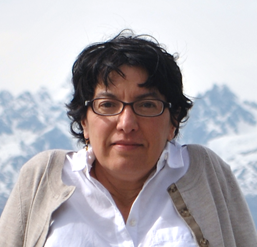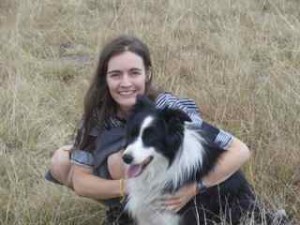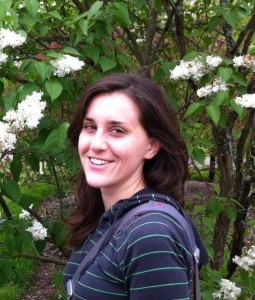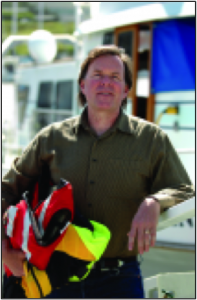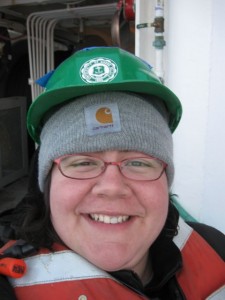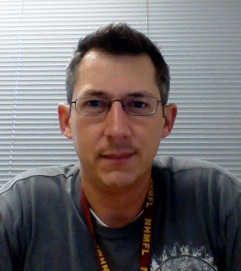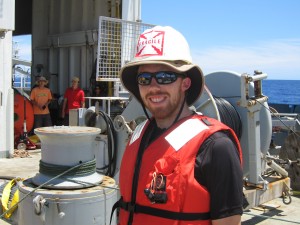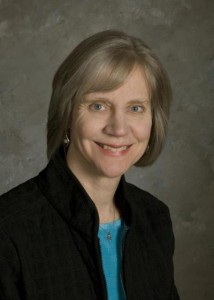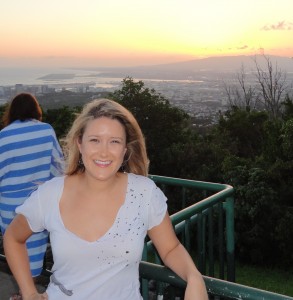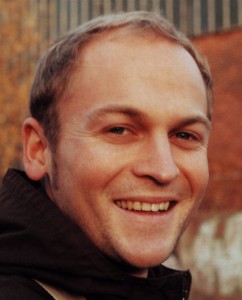Ana Aguilar-Islas, Ph.D. (Co-Chief Scientist)
Ana Aguilar-Islas is an assistant professor of oceanography at the University of Alaska Fairbanks. Dr. Aguilar-Islas is a chemical oceanographer with research interests that focus on the marine biocheochemical cycling of trace metals, particularly in high latitude regions. Her recent projects include the cycling of trace metals in sea ice, characterizing the dry atmospheric deposition of trace metals to the surface ocean, and investigating the cycling of iron in the Gulf of Alaska. Her motivation is to understand how different physical, chemical and biological processes regulate trace metal speciation and distribution in the open ocean and coastal regions, and how these in turn affect the ecosystem. During this cruise she will collaborate with Dr. Pete Morton to investigate the cross-shelf transport of dissolved and particulate trace metals in the Monterey Bay region.
Kim Bernard, Ph.D. (Co-Chief Scientist)
I am a biological oceanographer and Assistant Professor at Oregon State University. I am most interested in the factors that drive zooplankton distribution patterns and community structure, and how these, in turn, influence higher and lower trophic levels of the pelagic food web. My current research is focused on Antarctic pelagic ecosystems, where I am investigating the distribution patterns and densities of Antarctic krill in relation to a submarine canyon, with implications for top predator foraging. During the UNOLS Chief Scientist Training Program cruise, I plan to investigate the meso- and macrozooplankton community structure in the region of Monterey Canyon. The region is a key foraging ground for whales and seabirds and I am interested in looking at the distributions, densities and energy content of their planktonic prey.
Hilary Close, Ph.D.
I am a marine organic geochemist with broad interests in determining how microbial processes influence the amount, physical phases, and chemical composition of organic matter in the ocean. In order to pinpoint signatures of distinct microbial communities and degradative processes I employ a combination of targeted sampling of size classes of particles and biomass with detailed organic chemical and compound-specific stable isotope analyses. As a researcher in the Department of Geology and Geophysics at University of Hawai’i, I have been focusing on characterizing changes in organic matter over depth in the water column at Station ALOHA, and tying this in to the controls on availability of food sources to mesopelagic zooplankton and micronekton. At the same time, I have taken every opportunity I can to obtain samples from contrasting water columns in order to test environmental dependencies of the depth patterns I observe.
Kenneth Coale, Ph.D.
Kenneth Coale is a professor at Moss Landing Marine Laboratories: the graduate program in marine sciences and research facilities serving a consortium of seven California State University campuses. Dr. Coale is a marine biogeochemist who studies the cycles of chemicals in the sea and the natural and anthropogenic processes that influence these cycles. He was the Chief Scientist/Principal Investigator on all the US-led open ocean iron fertilization experiments in both the equatorial Pacific and Southern Ocean that have advanced the “Iron Hypothesis” of phytoplankton production and climate forcing. His research interests include trace element, carbon and nutrient cycling in ocean, coastal and freshwater systems; the application of natural and anthropogenic radionuclides in the study of marine rate processes; and the biogeochemical cycling of mercury in aquatic and atmospheric systems and the transport of Hg from the oceans to terrestrial systems via fog. Dr. Coale serves on the California Ocean Protection Council’s Science Advisory Team and is a Trustee for the Ocean Science Trust.
Elizabeth Harvey, Ph.D.
I am a post-doctoral investigator at Woods Hole Oceanographic Institution. My research focuses on investigating individual level interactions in the plankton in order to understand large-scale oceanographic processes such as carbon and nutrient cycling. The majority of my research focuses on the predator-prey interactions between phytoplankton and microzooplankton grazers. However, on this cruise I will be investigating interactions between phytoplankton and bacteria, and exploring a potential infochemical that may mediate their interaction. I will also serve as co-chief blogger for the cruise.
Pete Morton, Ph.D.
I study trace element cycling in the ocean, especially the transport of trace metals in aerosol particles to the ocean. As a postdoc at Florida State University, I use several analytical techniques with high resolution-ICP-MS to analyze marine samples, including solid-phase extraction of dissolved trace metals from seawater and microwave digestion of marine and aerosol particles. Recently, I have focused on the basin-wide distributions of trace metals in the Indian and Atlantic Oceans (CLIVAR program), to compare the relative inputs from aerosols and vertical mixing to the surface ocean. Due to the close interactions between microbes and trace elements, I also frequently collaborate with marine microbiologists on interdisciplinary process studies in the field and the lab.
Andy Pickering
I am a PhD candidate in physical oceanography at the University of Washington, advised by Matthew Alford. My research interests are in internal waves (especially near-inertial waves and internal tides) and their role in energy transport and mixing. I’m also interested in oceanographic instrumentation and data collection. For this training cruise, Gunnar Voet and I will be working together to collect observations of non-linear internal waves in Monterey Bay. We plan to make measurements using echosounders, shipboard ADCPs, and CTD casts. In my free time I can usually be found hiking in the Cascade Mountains of the Pacific Northwest.
Clare Reimers, Ph.D.
Clare Reimers is a chemical oceanographer and professor in the College of Earth, Ocean and Atmospheric Sciences of Oregon State University. On this cruise she is serving in the role of “mentor”. She is the current chair of the Fleet Improvement Committee of the U.S. University-National Oceanographic System (UNOLS). For UNOLS Clare works to optimize the capabilities and utilization of the U.S. fleet for academic oceanographic research and education.
Her areas of research specialization are benthic biogeochemistry and applied electrochemistry with emphasis on in situ measurements of redox conditions in natural waters and sediments, and the marine carbon cycle. Her present projects involve studies of benthic oxygen exchange in shelf environments using eddy correlation, and development and demonstration of microbial fuel cells as power sources for ocean instrumentation.
Christine Shulse, Ph.D.
I am a postdoctoral scholar at the University of Hawaii at Manoa in the Center for Microbial Oceanography: Research and Education. The objective of my research project is to understand the metabolisms of major clades of bacteria and archaea in sediments. This cruise opportunity will allow me to sample sediment for cell extraction and subsequent single cell genomics. Single cell genomics has the ability to link phylogeny to function in order to understand the physiology of major, uncultured clades of bacteria and archaea which constitute the “microbial dark matter,” or candidate phyla. In addition to my research I enjoy communicating science to the public, and will serve as co-chief blogger on this cruise.
Gunnar Voet, Ph.D.
I am a physical oceanographer at Scripps Institution of Oceanography.
I study deep ocean currents, dense overflows and turbulent mixing
associated with these. I enjoy the challenge of measuring large-scale
flow and small-scale turbulence at great depths. For this training
cruise, Andy Pickering and I will be working together to collect
observations of non-linear internal waves in Monterey Bay. We plan to
make measurements using echosounders, shipboard ADCPs, and CTD casts.

